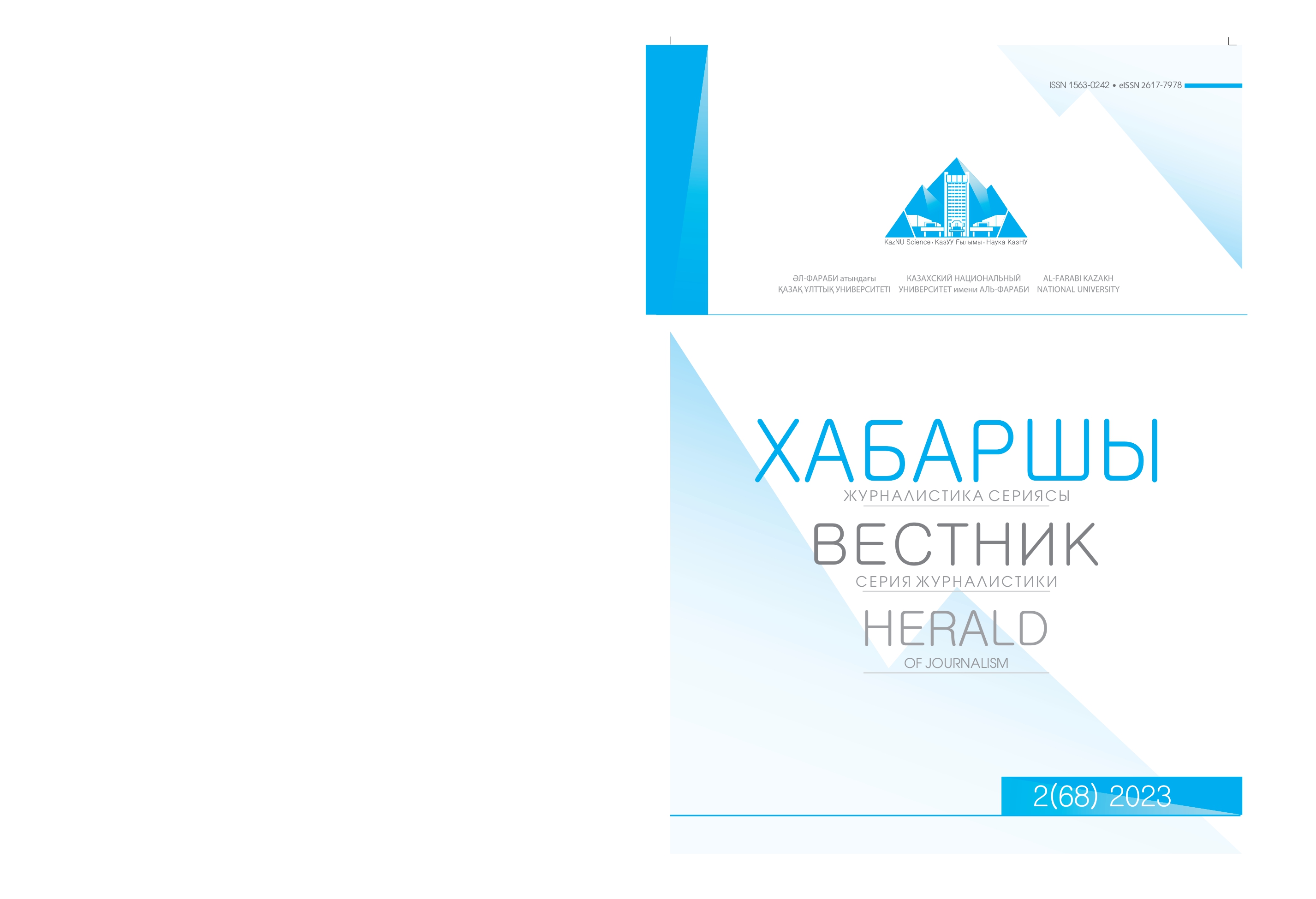О Саре Оатс и ее неосоветской модели медиа. Предисловие научного редактора перевода
DOI:
https://doi.org/10.26577/HJ.2023.v68.i2.02Аннотация
Читателю впервые предлагается перевод на русский язык программной статьи Сары Оатс «Неосоветская модель медиа», опубликованной в 2007 году (Sarah Oates, 2007). В предисловии научного редактора перевода обосновывается актуальность публикации. Дана характеристика теоретического контекста появления статьи, включая научную дискуссию о нормативных теориях медиа середины 2000-х годов. Цель научного осмысления – предложить критический взгляд на методику исследования Сары Оатс, а также ряд замечаний о трансформации российской медиасистемы за 16 лет, прошедшие после публикации статьи. В данной статье представлены две части: предисловие научного редактора и непосредственно перевод статьи Сары Оатс «Неосоветская модель медиа».Как указывается в аннотации Сары Оатс, в статье «исследуется генезис неосоветской модели средств массовой информации. На основе результатов изучения российских медиа в постсоветский период, а также обзора их деятельности во время выборов в указанном регионе, в статье делается вывод о том, что российские медиа в настоящее время функционируют в «неосоветском» ключе. В число факторов, формирующих эту модель медиа, входят отказ от сбалансированного подхода или объективности; наличие изъянов в законодательстве, регулирующем деятельность медиа; самоцензура; вмешательство государства и давление на СМИ; недостаток профессионализма в журналистской среде; а также атмосфера насилия в отношении журналистов. Кроме того, при переходе от советской к неосоветской модели имеет место преемственность в том, как медиа воспринимаются их аудиторией».
Ключевые слова: Сара Оатс, неосоветская модель медиа, медиасистема, цензура, постсоветское пространство, контент-анализ.
Библиографические ссылки
2. Oates S. Television, Democracy and Elections in Russia. London: RoutledgeCurzon, 2006.
3. Oates S. Revolution Stalled: The Political Limits of the Internet in the Post-Soviet Sphere. New York: Oxford University Press, 2013.
4. Оатс С. Перехватывайте нарратив // Русский журнал. 08.02.2011. Дата доступа: 12.07.2022. URL: http://russ.ru/Mirovaya-povestka/Perehvatyvajte-narrativ.
5. Sarah Oates (2007) The neo-Soviet model of the media, Europe-Asia Studies, 59:8, 1279-1297, DOI: 10.1080/09668130701655150
A reference to the preface
1. Oates S. Television, Democracy and Elections in Russia. London: RoutledgeCurzon, 2006.
2. Oates S. Revolution Stalled: The Political Limits of the Internet in the Post-Soviet Sphere. New York: Oxford University Press, 2013.
3. Zakon RF ot 27.12.1991 N 2124-1 (red. ot 01.07.2021) "O Sredstvah Massovoj Informatsii" (s izm. i dop., vstup. v silu s 29.06.2022). [The Law of the Russian Federation of 27.12.1991 N 2124-1 (ed. of 01.07.2021) "On Mass Media" (with amendments and additions, came into force on 06/29/2022)] Date of access: 12.07.2022. URL: http://www.consultant.ru/document/cons_doc_LAW_1511/. [In Russian]
4. Oates S. Perehvatyvajte Narrativ [Intercept the Narrative] // Russian Journal. 08.02.2011. Date of access: 12.07.2022. URL: http://russ.ru/Mirovaya-povestka/Perehvatyvajte-narrativ. [In Russian]
5. Sarah Oates (2007) The neo-Soviet model of the media, Europe-Asia Studies, 59:8, 1279-1297, DOI: 10.1080/09668130701655150
A reference of the original article by Sara Oates
1. Bennett, L.W. (2000). Media Power in the United States (Curran, J. & Park, M-J., Eds).
2. Curran, J. & Park, M-J. (2000). De-Westernizing Media Systems.
3. Dahl, R. (1989). Democracy and its Critics. Yale University Press.
4. Entman, R.M. (2003). Cascading Activation: Contesting the White House’s Frame after 9/11, Political Communication, 20, 4.
5. European Institute for the Media (2000a). Monitoring the Media Coverage of the December 1999 Parliamentary Elections in Russia: Final Report. European Institute for the Media. http://www.media-politics.com/eimreports.htm
6. European Institute for the Media (2000b). Monitoring the Media Coverage of the March 2000 Presidential Elections in Russia: Final Report. European Institute for the Media http://www.media-politics.com/eimreports.htm
7. Graber, D. (2005). Mass Media and American Politics (7th ed.). Congressional Quarterly Books.
8. Habermas, J. (1989). The Structural Transformation of the Public Sphere: An Inquiry into a Category of Bourgeois Society. Polity.
9. Hallin, D. & Mancini, P. (2003). Comparing Media Systems: Three Models of Media and Politics. Cambridge University Press.
10. Huntington, S. (1991). The Third Wave: Democratization in the late 20th Century. University of Oklahoma Press.
11. Hutcheson, J., Domke, D., Billeaudeaux, A. & Garland, P. (2004). US National Identity, Political Elites, and a Patriotic Press Following September 11. Political Communication, 21, 4.
12. Kachkaeva, A., Kiriya, I. & Libergal, G. (2006). Television in the Russian Federation: Organisational Structure, Programme Production and Audience. Internews Russia for the European Audiovisual Observatory. Educated Media Foundation.
13. McDonald, I.R. & Lawrence, R.G. (2004). Filling the 2467 News Hole: Television News Coverage Following September 11th. The Annual Meeting of the American Political Science Association.
14. Negrine, R. (1994). Politics and Mass Media in Britain (3rd ed.).
15. Oates, S. (2004). From the Archives of the European Institute for the Media: Analysing the Results of a Decade of Monitoring of Post-Soviet Elections. The British Association for Slavonic and East European Studies Conference, Fitzwilliam College. www.media-politics.com
16. Oates, S. (2006). Television, Democracy and Elections in Russia.
17. Pasti, S. (2005). Two Generations of Contemporary Russian Journalists. European Journal of Communication, 20, 1.
18. Schudson, M. (1995). The Power of News. Harvard University Press.
19. Siebert, F.S., Peterson, T. & Schramm, W. (1963) Four Theories of the Press. University of Illinois Press.
20. Smyth, R. (2006). Candidate Strategies and Electoral Competition in the Russian Federation: Democracy without Foundation. Cambridge University Press.
21. Sparks, C. (2000). ‘Media Theory After the Fall of European Communism: Why the Old Models from East and West Won’t Do Anymore’, in Curran, J. & Park, M-J. (eds).
22. Voltmer, K. (2000). Constructing Political Reality in Russia: Izvestiya—Between Old and New Journalistic Practices. European Journal of Communication, 15, 4.













